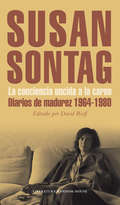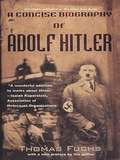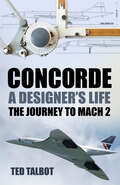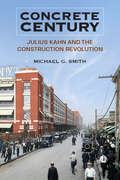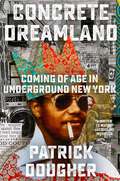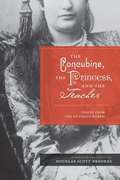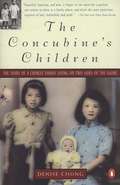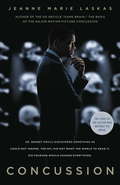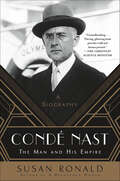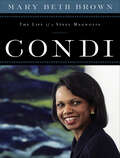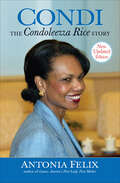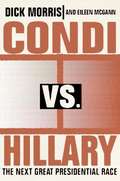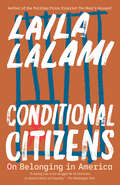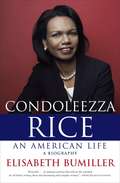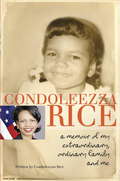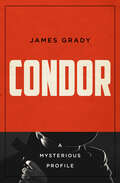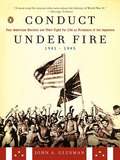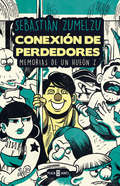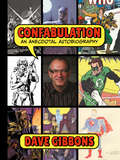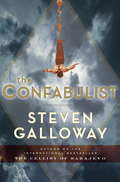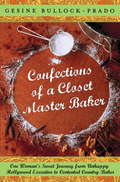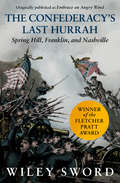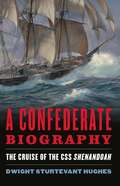- Table View
- List View
La conciencia uncida a la carne: Diarios de madurez 1964-1980
by Susan SontagLa conciencia uncida a la carne es el segundo volumen de los diarios de Susan Sontag, que abarcan desde 1964 a 1980. El segundo de los tres volúmenes de los diarios de Susan Sontag arranca donde acaba Renacida: a mediados de los años sesenta. Estos diarios trazan y documentan la evolución de la autora de principiante en el mundo artístico e intelectual de Nueva York a influyente crítica mundialmente reconocida con la publicación de Contra la interpretación en 1966. La conciencia uncida a la carne sigue a Sontag durante los turbulentos años de la década de los sesenta -sus viajes a Hanoi en el punto álgido de la guerra de Vietnam y a Suecia para rodar largometrajes-, hasta los ochenta y el inicio de la era Reagan. Este libro es un registro de incalculable valor de los mecanismos internos, emocionales, espirituales e intelectuales de una de las pensadoras más incisivas y analíticas del siglo XX en pleno apogeo de sus facultades, además de una ventana al despertar político y moral del individuo.
A Concise Biography of Adolf Hitler
by Thomas Fuchs"Four Stars." --West Coast Review of Books "Fascinating reading." --Booklist "An engrossing book...excellent." --Oahu Sun Press
Concorde, A Designer's Life: The Journey to Mach 2
by Ted TalbotDo you remember the time we used to do New York in three hours?Even twenty years after its final flight, Concorde remains the pinnacle of aviation design. The aircraft is still unmatched, which has led to a vast swathe of material being written about the aeroplane itself. However, relatively little has been said about the people who designed it.Concorde, A Designer’s Life is an autobiography peppered with anecdotes from the team, humorous life stories and several ‘technibits’, all covering the design period of Concorde. Ted Talbot, who began his career at BAC as an aerodynamicist and later became chief design engineer, has combined the technical narrative with personal and family reminiscences to remind the reader that engineers have lives too.The path to Mach 2 was bumpy, with threats of cancellation and opposition from the Americans and the Russians, but this generally indicated to the Concorde team that they were on the right path! This informative, witty and thoroughly enjoyable peek into an unusual life is a valuable addition to any bookshelf.
Concrete Century: Julius Kahn and the Construction Revolution
by Michael G SmithAt the turn of the 20th century, industrial manufacturing was expanding dramatically while factory buildings remained fire-prone relics of an earlier age. That is, until a 28-year-old civil engineer finally achieved what engineers around the world had unsuccessfully attempted. Working in his brother’s basement in Detroit, Julius Kahn invented the first practical and scientific method of reinforcing concrete with steel bars, which finally made it possible to construct strong, fireproof buildings. After Kahn founded a company in 1903 to manufacture and sell his reinforcement bars, his system of construction became the most widely used throughout the world. Drawing upon Kahn’s personal correspondence, architectural drawings, company records, and contemporary news and journal articles, Michael G. Smith reveals how this man—whose family had immigrated to the US to escape antisemitism in Germany—played an important role in the rise of concrete. Concrete not only turned the tide against widespread destruction of buildings by fire, it also paved the way for our modern economy. Concrete Century will delight readers intrigued by architecture and construction technology alike with the true origin story of modern concrete buildings.
Concrete Dreamland: Coming of Age in Underground New York
by Patrick DougherFrom an award-winning artist who was featured in Humans of New York comes a bold personal narrative about overcoming family trauma, addiction, poverty—and forging a creative life in the greatest city in the world. Born in Brooklyn in 1963, Patrick Dougher grew up in some of the most turbulent and culturally impactful periods of NYC's history. Often neglected as a child by his parents—a father who struggled with alcohol addiction and an overworked mother who struggled to make ends meet—he learned to fend for himself. Now a renowned visual artist, musician, actor and writer, Dougher brings to the page his memories, struggles, personal revelations, and a life intimately tied to the realities of growing up Black and disenfranchised on the streets of one of the most remarkable cities in the world.Concrete Dreamland is tragic and triumphant, gritty and hard, poetic and outrageously funny. Told in Dougher's brutally raw and courageously honest voice, these stories act as snapshots of a life lived in extremes: from gangsters to God, street style to sexuality, to recovery from drug addiction and alcoholism. He tells of his adventures as a pre-hip hop &“hard rock' and an original Black punk rocker surviving during the dangerous days of the crack and AIDS epidemic in NYC, while also sharing tales of racism, homelessness, and his many brushes with fame and death. Audacious, unique, and moving, Concrete Dreamland is an unforgettable story of addiction, redemption, and life on the streets of a vanishing New York.
The Concubine, The Princess, and The Teacher
by Douglas Scott BrookesIn the Western imagination, the Middle Eastern harem was a place of sex, debauchery, slavery, miscegenation, power, riches, and sheer abandon. But for the women and children who actually inhabited this realm of the imperial palace, the reality was vastly different. In this collection of translated memoirs, three women who lived in the Ottoman imperial harem in Istanbul between 1876 and 1924 offer a fascinating glimpse "behind the veil" into the lives of Muslim palace women of the late nineteenth and early twentieth centuries. The memoirists are Filizten, concubine to Sultan Murad V; Princess Ayse, daughter of Sultan Abdulhamid II; and Safiye, a schoolteacher who instructed the grandchildren and harem ladies of Sultan Mehmed V. Their recollections of the Ottoman harem reveal the rigid protocol and hierarchy that governed the lives of the imperial family and concubines, as well as the hundreds of slave women and black eunuchs in service to them. The memoirists show that, far from being a place of debauchery, the harem was a family home in which polite and refined behavior prevailed. Douglas Brookes explains the social structure of the nineteenth-century Ottoman palace harem in his introduction. These three memoirs, written across a half century and by women of differing social classes, offer a fuller and richer portrait of the Ottoman imperial harem than has ever before been available in English.
The Concubine's Children
by Denise ChongChong tells the story of her grandmother, brought from China by a man to the New World. The man's wife and children left behind, and the author incredibly discovers those children six decades later.
Concussion
by Jeanne Marie Laskas<P>Soon to be a major motion picture starring Will Smith, Concussion is the riveting, unlikely story of Dr. Bennet Omalu, the pathologist who made one of the most significant medical discoveries of the twenty-first century, a discovery that challenges the existence of America's favorite sport and puts Omalu in the crosshairs of football's most powerful corporation: the NFL. <P>Jeanne Marie Laskas first met the young forensic pathologist Dr. Bennet Omalu in 2009, while reporting a story for GQ that would go on to inspire the movie Concussion. Omalu told her about a day in September 2002, when, in a dingy morgue in downtown Pittsburgh, he picked up a scalpel and made a discovery that would rattle America in ways he'd never intended. <P>Omalu was new to America, chasing the dream, a deeply spiritual man escaping the wounds of civil war in Nigeria. The body on the slab in front of him belonged to a fifty-year-old named Mike Webster, aka "Iron Mike," a Hall of Fame center for the Pittsburgh Steelers, one of the greatest ever to play the game. After retiring in 1990, Webster had suffered a dizzyingly steep decline. Toward the end of his life, he was living out of his van, tasering himself to relieve his chronic pain, and fixing his rotting teeth with Super Glue. <P>How did this happen?, Omalu asked himself. How did a young man like Mike Webster end up like this? The search for answers would change Omalu's life forever and put him in the crosshairs of one of the most powerful corporations in America: the National Football League. <P>What Omalu discovered in Webster's brain--proof that Iron Mike's mental deterioration was no accident but a disease caused by blows to the head that could affect everyone playing the game--was the one truth the NFL wanted to ignore. <P> Taut, gripping, and gorgeously told, Concussion is the stirring story of one unlikely man's decision to stand up to a multibillion-dollar colossus, and to tell the world the truth. <P><b>A New York Times Bestseller</b>
Condé Nast: The Man and His Empire: A Biography
by Susan RonaldThe first biography in over thirty years of Condé Nast, the pioneering publisher of Vogue and Vanity Fair and main rival to media magnate William Randolph Hearst.Condé Nast’s life and career was as high profile and glamorous as his magazines. Moving to New York in the early twentieth century with just the shirt on his back, he soon became the highest paid executive in the United States, acquiring Vogue in 1909 and Vanity Fair in 1913. Alongside his editors, Edna Woolman Chase at Vogue and Frank Crowninshield at Vanity Fair, he built the first-ever international magazine empire, introducing European modern art, style, and fashions to an American audience. Credited with creating the “café society,” Nast became a permanent fixture on the international fashion scene and a major figure in New York society. His superbly appointed apartment at 1040 Park Avenue, decorated by the legendary Elsie de Wolfe, became a gathering place for the major artistic figures of the time. Nast launched the careers of icons like Cecil Beaton, Clare Boothe Luce, Lee Miller, Dorothy Parker and Noel Coward. He left behind a legacy that endures today in media powerhouses such as Anna Wintour, Tina Brown, and Graydon Carter.Written with the cooperation of his family on both sides of the Atlantic and a dedicated team at Condé Nast Publications, critically acclaimed biographer Susan Ronald reveals the life of an extraordinary American success story.
Condi: The Life of a Steel Magnolia
by Mary Beth BrownAn in-depth look at the life, faith, and achievements of one of America’s most fascinating women.“One day I’ll be in that house,” said ten-year-old Condoleezza Rice as she gazed across the White House’s expansive front lawn.Of course, Condi made good on that promise. With poise and gracefulness—combined with an iron will and determination—rarely seen in Washington, Rice has become one of the most iconic and influential figures on the world stage. This is her story.Condi provides an in-depth study of the life, faith, and achievements of one of America’s most fascinating women. From her humble beginnings in segregated Alabama to her academic career, from her first days in Washington to her appointment as Secretary of State and beyond, Condi investigates Rice’s rise to political prominence. Drawing from in-depth research, Mary Beth Brown explores how Condi’s parents, mentors, faith, and defining moments have helped her grow into a position of power and global influence.Here is a story of inspiration, of principle, and of the limitless opportunities for those who pursue their dreams with unfailing hope and dogged determination.
Condi: The Condoleezza Rice Story
by Antonia FelixThis is the remarkable and galvanizing true story of Condoleezza Rice—sixty-sixth United States Secretary of State under President George W. Bush, who once said about his close confidante, "Dr. Rice is not only a brilliant person, she is an experienced person. . . . America will find that she is a wise person."With the current release of her own long-awaited memoir, Condoleezza Rice is more fascinating than ever. Drawing from exclusive interviews with dozens of friends, relatives, colleagues, and teachers, as well as scores of previous articles and interviews, this thoroughly researched and detailed biography paints a compelling portrait of a born leader of resolute character who broke all barriers to excel as a black woman in an arena usually dominated by white men.From her childhood in segregated Birmingham, Alabama, where her parents fostered a love of learning and excellence at an early age, to her calling to the arts as an outstanding classical pianist, to her rise through the political ranks to the halls of power in Washington, D.C., Condi is a revealing look at the most gifted and influential woman in American political history.
Condi vs. Hillary
by Eileen Mcgann Dick MorrisWho will be president in 2008? Many believe that the White House is Hillary Clinton's to lose. As long-time strategists Dick Morris and Eileen McGann reveal in Condi vs. Hillary, however, Hillary's plans for higher office are vulnerable to a challenge from a most unexpected quarter: the Bush administration's secretary of state and former national security advisor, Condoleezza Rice. Rice is the only figure on the national scene who has the credentials, the credibility, and the charisma to lead the GOP in 2008. And, as this first book on the subject demonstrates, a race between these two commanding, but very different, women is a very real possibility -- and would inevitably prove one of the most fascinating and important races in American history. Blending insider insight and political foresight, Condi vs. Hillary surveys the strengths and weaknesses of the two candidates, finding persuasive clues about what we might expect from each of them as a chief executive. It traces their very different childhoods -- Hillary Rodham's in unchallenging suburban comfort, Condi Rice's in Birmingham, Alabama, during the civil rights era -- and finds in each the roots of their latter-day selves. It explores their career in public life -- Hillary's as an ambitious liberal who attached herself to a governor on the rise, Condi's as a woman of broad and deep talents who has earned her own way. It turns a discerning eye on how each has spent her time in government, contrasting Condi's growth and maturation in office with Hillary's record of underachievement as both first lady and senator from New York. And it reveals how a draft-Condi movement could sweep the secretary of state into the presidency even as she forgoes campaigning to address her responsibilities as secretary of state. America, in short, may be on the verge of a perfect storm of twenty-first-century politics, pitting two of America's most popular -- and controversial -- women against each other, and offering Americans a choice between fulfilling the ambitions of one of our most polarizing figures . . . or changing history by electing not just the first woman, but also the first African American woman, to lead the free world into the future.
Conditional Citizens: On Belonging in America
by Laila LalamiWhat does it mean to be American? <P><P>In this starkly illuminating and impassioned book, Pulitzer Prize–finalist Laila Lalami recounts her unlikely journey from Moroccan immigrant to U.S. citizen, using it as a starting point for her exploration of the rights, liberties, and protections that are traditionally associated with American citizenship. Tapping into history, politics, and literature, she elucidates how accidents of birth—such as national origin, race, and gender—that once determined the boundaries of Americanness still their shadows today. Lalami poignantly illustrates how white supremacy survives through adaptation and legislation, with the result that a caste system is maintained that keeps the modern equivalent of white male landowners at the top of the social hierarchy. <P><P>Conditional citizens, she argues, are all the people with whom America embraces with one arm and pushes away with the other. Brilliantly argued and deeply personal, Conditional Citizens weaves together Lalami’s own experiences with explorations of the place of nonwhites in the broader American culture.
Condoleezza Rice: A Biography
by Elisabeth BumillerCondoleezza Rice, one of most powerful and controversial women in the world, has until now remained a mystery behind an elegant, cool veneer. In this stunning new biography, a "New York Times" reporter peels back the layers and presents a revelatory portrait of the first black female secretary of state.
Condoleezza Rice: A Memoir of My Extraordinary, Ordinary Family and Me
by Condoleezza RiceIn this captivating memoir for young people, looking back with candor and affection, Condoleezza Rice evokes in rich detail her remarkable childhood.Her life began in the comparatively placid 1950s in Birmingham, Alabama, where black people lived in a segregated parallel universe to their white neighbors. She grew up during the violent and shocking 1960s, when bloodshed became a part of daily life in the South. Rice's portrait of her parents, John and Angelena, highlights their ambitions and frustrations and shows how much they sacrificed to give their beloved only child the best chance for success. Rice also discusses the challenges of being a precocious child who was passionate about music, ice skating, history, and current affairs. Her memoir reveals with vivid clarity how her early experiences sowed the seeds of her political beliefs and helped her become a vibrant, successful woman.Condoleezza Rice: A Memoir of My Extraordinary, Ordinary Parents and Me is a fascinating and inspirational story for young people.From the Hardcover edition.
Condor: An E-book Original Story (Mysterious Profiles #25)
by James GradyDecades after his adventure in the classic Six Days of the Condor, the eponymous spy reflects on his life while awaiting his next target in this tense novella. Ronald Malcolm, codename Condor, is still in the spy game. He may be older now, but in a world where hardly anybody sees anybody, nobody sees old. He&’s the perfect choice to sit in New York City&’s Penn Station and wait for what he calls &“the killing train.&” And while he waits for someone to take a life, he reflects on his own life. He wonders what has brought him to this moment. He looks back over memories of his childhood, his recruitment to the CIA, and that bloody day at the American Literary Historical Society that changed everything for him. But he must be careful not to get too lost on memory lane. The clock is ticking, and targets are on the move. He can&’t afford to get caught with his head in the clouds . . .Praise for James Grady &“A chilling novel of top security gone berserk . . . Breakneck . . . Not a slow minute.&” —Library Journal on Six Days of the Condor &“Grady&’s writing has changed dramatically over the years, evolving into a literary, impressionistic style . . . [It] is a perfect fit for the aging, unhinged, yet still-lethal Condor. This is an author writing at the top of his, or anyone else&’s, game.&” —Publishers Weekly (starred review) on Condor: The Short Takes
Conduct Under Fire: Four American Doctors and Their Fight for Life as Prisoners of the Japanese, 1941-1945
by John A. GlusmanThe fierce, bloody battles of Bataan and Corregidor in the Philippines are legendary in the annals of World War II. Those who survived faced the horrors of life as prisoners ofthe Japanese.In Conduct Under Fire, John A. Glusman chronicles these events through the eyes of his father, Murray, and three fellow navy doctors captured on Corregidor in May 1942. Here are the dramatic stories of the fall of Bataan, the siege of "the Rock," and the daily struggles to tend the sick, wounded, and dying during some of the heaviest bombardments of World War II. Here also is the desperate war doctors and corpsmen waged against disease and starvation amid an enemy that viewed surrender as a disgrace. To survive, the POWs functioned as a family. But the ties that bind couldn't protect them from a ruthless counteroffensive waged by American submarines or from the B-29 raids that burned Japan's major cities to the ground. Based on extensive interviews with American, British, Australian, and Japanese veterans, as well as diaries, letters, and war crimes testimony, this is a harrowing account of a brutal clash of cultures, of a race war that escalated into total war.Like Flags of Our Fathers and Ghost Soldiers, Conduct Under Fire is a story of bravery on the battlefield and ingenuity behind barbed wire, one that reveals the long shadow the war cast on the lives of those who fought it.
Conduct Under Fire
by John A. GlusmanThe fierce, bloody battles of Bataan and Corregidor in the Philippines are legendary in the annals of World War II. Those who survived faced the horrors of life as prisoners of the Japanese. In Conduct Under Fire, John A. Glusman chronicles these events through the eyes of his father, Murray, and three fellow navy doctors captured on Corregidor in May 1942. Here are the dramatic stories of the fall of Bataan, the siege of "the Rock," and the daily struggles to tend the sick, wounded, and dying during some of the heaviest bombardments of World War II. Here also is the desperate war doctors and corpsmen waged against disease and starvation amid an enemy that viewed surrender as a disgrace. To survive, the POWs functioned as a family. But the ties that bind couldn't protect them from a ruthless counteroffensive waged by American submarines or from the B-29 raids that burned Japan's major cities to the ground. Based on extensive interviews with American, British, Australian, and Japanese veterans, as well as diaries, letters, and war crimes testimony, this is a harrowing account of a brutal clash of cultures, of a race war that escalated into total war. Like Flags of Our Fathers and Ghost Soldiers, Conduct Under Fire is a story of bravery on the battlefield and ingenuity behind barbed wire, one that reveals the long shadow the war cast on the lives of those who fought it.
Conexión de perdedores: Memorias de un hueón Z
by Sebastián ZumelzuUna novela autobiográfica que describe las vicisitudes de un joven millenial de manera crítica e hilarante Recién egresado del colegio, Z duda si seguir una carrera tradicional u otra más creativa. Finalmente logra convencer a sus padres de seguir su vocación de realizador audiovisual y, ya inserto en el mundo universitario, rompe la burbuja social y abre los ojos ante el mundo y, sobre todo, ante el espejo. Dueño de un gran oído y léxico, Zumelzu construye con mucho vértigo, humor y calle una radiografía de una generación marcada por la falta de compromiso y conformidad. Un estupendo debut narrativo de un autor dotado de velocidad y frescura.
Confabulation: An Anecdotal Autobiography by Dave Gibbons
by Dave GibbonsThis comprehensive, in-depth, and personal journey through the eyes of one of the world&’s most famous comics creators, Dave Gibbons, spans his earliest years copying Superman and Batman comics as a kid, to co-creating the bestselling graphic novel of all-time, Watchmen, and beyond.Presented alphabetically, with informally written anecdotes that can be read from cover-to-cover or simply dipped into, Gibbons reveals unseen comics&’ pitches, life as the first Comics Laureate, and going from being a fanzine artist to infiltrating DC Comics in the 1970s. The book covers everything from working on Doctor Who and meeting Tom Baker to being inducted into the Eisner Hall of Fame. Gibbons also discusses, for the first time anywhere, the reasons why he and fellow Watchmen co-creator Alan Moore no longer speak. Packed with over 300 iconic, rarely seen, and unpublished art pieces and photographs, Confabulation: An Anecdotal Autobiography not only entertains, but peels back the layers of a fascinating career in comics.
The Confabulist
by Steven GallowayFrom the beloved, award-winning, bestselling author of The Cellist of Sarajevo, a beautiful, suspense-filled novel that uses the life and sudden death of Harry Houdini to weave a magical tale of intrigue, love and illusion. The Confabulist weaves together the life, loves and murder of the world's greatest magician, Harry Houdini, with the story of the man who killed him (twice): Martin Strauss, an everyday man whose fate was tied to the magician's in unforeseen ways. A cast of memorable characters spins around Houdini's celebrity-driven life, as they did in his time: from the Romanov family soon to be assassinated, to Sir Arthur Conan Doyle and the powerful heads of Scotland Yard, and the Spiritualists who would use whoever they could to establish their religion. A brilliant novel about fame and ambition, reality and illusion, and the ways that love, grief and imagination can alter what we perceive and believe.
Confections of a Closet Master Baker
by Gesine Bullock-PradoA former Hollywood insider trades the Hollywood Hills for Green Acres--and lives to tell about it in this hilarious, poignant treat of a memoir.As head of her celebrity sister's production company, Gesine Bullock-Prado had a closet full of designer clothes and the ear of all the influential studio heads, but she was miserable. The only solace she found was in her secret hobby: baking. With every sugary, buttery confection to emerge from her oven, Gesine took one step away from her glittery, empty existence--and one step closer to her true destiny. Before long, she and her husband left the trappings of their Hollywood lifestyle behind, ending up in Vermont, where they started the gem known as Gesine Confectionary. And they never looked back. Confections of a Closet Master Baker follows Gesine's journey from sugar-obsessed child to miserable, awkward Hollywood insider to reluctant master baker. Chock-full of eccentric characters, beautifully detailed descriptions of her baking process, ceaselessly funny renditions of Hollywood nonsense, and recipes, the ingredients of her story will appeal to anyone who has ever considered leaving the life they know and completely starting over.From the Hardcover edition.
Confederacy of Silence: A True Tale of the New Old South
by Richard RubinDiscussion of the New South by a news correspondent on a Southern paper.
The Confederacy's Last Hurrah: Spring Hill, Franklin, and Nashville (Modern War Studies)
by Wiley SwordThe rise of Civil War general John Bell Hood, his command of the Confederate Army of Tennessee, and the decisions that led to its downfall. Though he barely escaped expulsion from West Point, John Bell Hood quickly rose through the ranks of the Confederate army. With bold leadership in the battles of Gaines&’ Mill and Antietam, Hood won favor with Confederate president Jefferson Davis. But his fortunes in war took a tragic turn when he assumed command of the Confederate Army of Tennessee. After the fall of Atlanta, Hood marched his troops north in an attempt to draw Union army general William T. Sherman from his devastating &“March to the Sea.&” But the ploy proved ruinous for the South. While Sherman was undeterred from his scorched-earth campaign, Hood and his troops charged headlong into catastrophe. In this compelling account, Wiley Sword illustrates the poor command decisions and reckless pride that made a disaster of the Army of Tennessee&’s final campaign. From Spring Hill, where they squandered an early advantage, Hood and his troops launched an ill-fated attack on the neighboring town of Franklin. The disastrous battle came to be known as the &“Gettysburg of the West.&” But worse was to come as Hood pressed on to Nashville, where his battered troops suffered the worst defeat of the entire war. Winner of the Fletcher Pratt Award for best work of nonfiction about the Civil War, The Confederacy&’s Last Hurrah chronicles the destruction of the South&’s second largest army. &“Narrated with brisk attention to the nuances of strategy—and with measured solemnity over the waste of life in war,&” it is a groundbreaking work of scholarship told with authority and compassion (Kirkus Reviews).
A Confederate Biography: The Cruise Of Css Shenandoah
by Dwight HughesBased primarily on the words of those who lived it, A Confederate Biography is a comprehensive narrative of the cruise of the CSS Shenandoah. More than a thrilling sea story, the journey provides a window of historical perspective on the Civil War. From October 1864 to November 1865, the officers of the Shenandoah carried the Confederacy and the conflict around the globe and to the ends of the earth through every extreme of sea and storm. Their observations looking back from the most remote and alien surroundings imaginable, along with viewpoints of those they encountered, illuminate the hearts and minds of contestants North and South. These Americans stood together in defense of their country as they understood it, pursuing a difficult and dangerous mission in which they succeeded spectacularly after it no longer mattered. Through their eyes, the potentially decisive international arena of the war, governed by complex maritime and trade law, comes alive. The neutrality, or lack thereof, of major European powers was a central concern to both sides. Shenandoah was smack in the middle of this diplomatic maelstrom and contributed to it. And within the navy, a generational clash arose between antebellum orthodoxy and a professional officer corps emerging from the new Naval Academy, rapid technological advances, contemporary social reforms, and the crucible of war. This difference was manifest between the captain of Shenandoah and his young lieutenants. The men they led, however, were a polyglot assemblage of merchant sailors of nearly every nation and color--including several Yankees and African Americans--operating within its own rigidly authoritarian and cramped society. Shenandoah herself was a magnificent vessel, the epitome of rich and ancient maritime heritages, but also a paradigm of dramatic transitions from the small wooden sailing navy to the second largest, most powerful, and technologically advanced fleet in the world. Her commerce raiding mission was a watery form of asymmetric warfare in the spirit of John Mosby, Bedford Forrest, and W. T. Sherman. It was arguably the most successful military effort of the Confederacy in terms of cost versus mission accomplished, but the strategic effectiveness of the strategy remains questionable. Shenandoah fired the last gun of the Civil War, set the land of the midnight sun aglow with flaming Yankee whalers, and, seven months after Appomattox, lowered the last Confederate banner. This is a biography of a ship and a cruise, and a microcosm of the Confederate-American experience.
